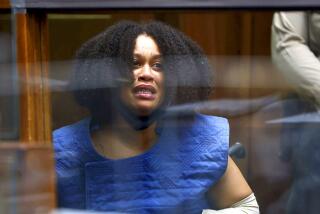Written Citation
- Share via
The attitudes of the teenagers in Leora Krygier’s courtroom range from mortified to calm. But regardless of the differences, the Juvenile and Informal Traffic Court referee wants the teens to gain a better understanding of how tragic an auto accident can be.
In addition to fines, community service or license suspension, Krygier for the last six months has assigned essays to teenagers for neglecting the rules of the road. She tells them to write a 300-word response to a short story about a 17-year-old boy killed last July in a car accident near Six Flags Magic Mountain.
“The Road” was written by Jayce Crawford, a friend of Krygier’s from a Los Angeles amateur writers group. It is the true story of how a mother’s life was forever changed by the death of her son. It tells of a mother who cradles photos of the boy, his old drawings and a Mother’s Day card.
“I’ve always believed in the power of the written word and stories,” said Krygier, 48, from her room at the Van Nuys Courthouse. “Maybe [the story] could reach somebody who was unreachable otherwise and give them a different perspective.”
Krygier said she hopes that by reading “The Road,” teens will understand the sense of loss and grief suffered by a parent whose child is killed, and it will convince young motorists to change their driving habits.
Although Krygier has no way of knowing whether the essays result in safer driving, the responses have been thoughtful and sincere.
“The kids are eager to do it,” she said. “I feel intervention is more effective than a fine. Sometimes a fine can be meaningless.”
Karly Beze, 18, of Burbank, who was cited for speeding on the freeway, said the essay assignment “really made me think. I can be responsible for others dying.”
Her mother, Pamela Beze, also read [Crawford’s] story and said it should serve as a wake-up call to teens. “I think it gives [teens] one more chance to think about what they did and realize they’re not infallible.”
Jonathan Daniel, 17, of Tarzana said writing the essay made him think more about the results of careless driving after he was caught racing in North Hollywood.
“The mother in the story was reflecting on her son and his past achievements,” he said. “If I were to die, it would affect my whole family.”
Crawford uses the winding San Francisquito Canyon Road in the Santa Clarita Valley, where the boy in the story was killed, as a metaphor for both the teenager’s fatal journey and the obstacles now facing his mother. Crawford said she wrote the story for the mother, a close friend, as a way to deal with the woman’s pain.
‘There’s No Going Back’
The story’s lack of optimism, Crawford said, is a cruel reminder that parents and family face almost insurmountable odds when trying to recover from such tragedies.
“If your child dies that way, there’s no going back,” Crawford said. “Life is never the same.”
Using creative and intervention techniques to reach juveniles is nothing new. Krygier and many other judges and referees send teens to county morgues and hospital emergency rooms for the shock value. But Los Angeles County court officials know of no other essay program.
“Our whole philosophy is modification of behavior,” said David Searcy, supervising referee for the county’s juvenile court system. “[Teens] are risk takers. They have poor judgment, so making them stop and think is one of our goals.”
Unlike a judge, who is elected, referees such as Krygier are appointed by the county’s presiding judge. Their influence on kids can be just as profound as that of a judge.
Krygier, a lawyer who specialized in civil and juvenile law before becoming a referee eight years ago, was the first county referee to introduce a school liaison into the courtroom, Searcy said. The liaison can determine if the teen requires special needs, such as counseling or testing. Teens can visit the school liaison directly after being sentenced.
“She’s innovative,” Searcy said of Krygier. “She has done a lot for us.”
Story Seems to Reach Teens
Krygier assigns 10 to 15 essays a week from her 9-by-10-foot courtroom. She said she approaches her job not only as a referee but as a parent of a 9-year-old and a 13-year-old.
When Krygier first read “The Road,” she was deeply moved, she said, and wondered if it would have the same effect on the people who need it the most.
A stack of essays sits on her desk. One reads: “After a long discussion with my parents, I feel it is my responsibility and in my power to prevent the fear, sorrow and emptiness parents feel after losing their child to a car accident.
“I have learned that driving is a privilege that should not be abused and taken for granted. And my life as well as someone else’s life on the same road with me should not be put in danger by reckless driving.
“It is my choice to avoid ending up on the same winding road as this teenager did.”



